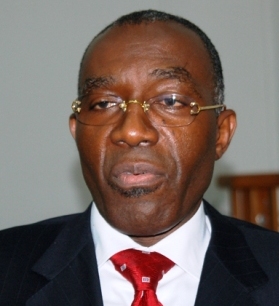
Uganda’s State Minister for Foreign Affairs Henry Oryem Okello suggested that Congolese officials had balked at signing a “peace deal” that had been agreed upon and had instead “asked for more time” to consider the document.
DR Congo’s Foreign Minister Raymond Tshibanda said that the wording and the title of the document was important because the situation on the ground had changed.
The “Kampala peace talks” between DR Congo and the M23 rebels have gone on for nearly a year. But last week the Congolese army recaptured all territories once occupied by the rebels after the peace talks broke down again two weeks earlier.
The Congolese government then said it would no longer sign a “peace deal” with the M23 rebels, but would sign a document marking the end of the rebellion.
Uganda’s Defense Minister and chief mediator Cyprus Kyonga said on Monday he was still optimistic that an agreement could be reached.
“We need time to consult with each party,... there are issues of fine-tuning language and some words,” Mr. Kyonga said.
Congolese authorities have always faced strong opposition at home against signing a “peace deal” with the M23 rebels.
Signing a “peace deal” would even make less sense now that the Congolese army, backed by UN peacekeepers, has dislodged the rebels from all the territory they occupied for more than a year in North Kivu province.
Congolese authorities have also not forgotten that the M23 rebels claimed that the government had failed to abide by an earlier peace deal signed on March 23, 2009, as a pretext to launch their rebellion last year.
After defeating the rebels militarily, why give them the opportunity to later use yet another “peace deal” as a pretext to launch a new rebellion?
But Ugandan officials have been pushing for a deal as if the situation on the ground had remained the same as it was three weeks ago, when the M23 rebels still controlled large swathes of land, and refused then to sign a peace deal if rebels who had committed war crimes and crimes against humanity were not granted a complete amnesty.
Some Congolese analysts have always called into question the impartiality of the Ugandan government. Uganda and Rwanda have been accused by the United Nations and rights groups of supporting the M23 rebels.
Ugandan officials claimed last week that close to 1,700 rebels had fled into their territory, a number disputed by officials in North Kivu province, who put the number at a couple of hundreds at most.
Ugandan officials have also said that the fugitive rebels will be disarmed but will not be handed over to Congolese authorities, including M23 military commander Sultani Makenga, who is wanted by DR Congo’s government and is under U.N. and U.S. sanctions.
The U.N. and African Union-brokered Addis Ababa Framework Agreement, signed in February by 11 countries to tackle the conflict in eastern Congo, calls on neighboring countries to “neither harbor nor provide protection of any kind to persons accused of war crimes, crimes against humanity, acts of genocide or crimes of aggression, or persons falling under the UN sanctions regime.”
Related articles
- • DRC and Rwanda Sign Declaration of Principles for Peace in Eastern Congo (April 25, 2025)
- • European Union Sanctions Rwanda and M23 Officials over Congo Conflict (March 17, 2025)
- • Canada and Germany Impose Sanctions on Rwanda for Supporting M23 Rebels (March 4, 2025)
- • UK Suspends Financial Aid to Rwanda Over M23 Rebellion (February 25, 2025)
- • European Union Suspends Defence Consultations with Rwanda (February 24, 2025)
- • Tshisekedi Announces Government of National Unity and Calls for Unity Against M23 Rebels (February 23, 2025)
- • UN Security Council Calls on Rwanda to Stop Supporting M23 Rebels in DR Congo (February 22, 2025)
- • US Sanctions Rwanda's Minister James Kabarebe for Central Role in DR Congo Conflict (February 20, 2025)
- • Rwanda-Backed M23 Rebels Summarily Executed Children in Bukavu, UN Reports (February 19, 2025)
- • DR Congo Citizens Head to Polls to Elect President, Members of Parliament (December 20, 2023)
- • 'Deadly environment' plus 'political and social' obstacles hinder Ebola fight, Security Council hears (July 24, 2019)
- • Ebola outbreak declared an international Public Health Emergency (July 17, 2019)
- • Constitutional Court Declares Tshisekedi Winner of Presidential Election (January 19, 2019)
- • At least 30 dead after massacres in Ituri (March 2, 2018)
- • Peacekeepers, Congo Army to Resume Joint Fight Against Rwandan Rebels (January 28, 2016)
- • Political tensions 'running high' in DR Congo ahead of 2016 elections (October 7, 2015)
- • UN Report Blames Ugandan Islamists for 237 Killings in DR Congo (May 14, 2015)
- • DRC Army Putting Pressure on FDLR (April 1, 2015)
- • Denis Mukwege Wins Sakharov Prize 2014 (October 21, 2014)
- • Violence in North Kivu Kills 21, Mostly Women, Children (October 18, 2014)
- • ICC confirms war crimes charges against Bosco Ntaganda (June 10, 2014)
- • Kerry Calls on Kabila to Honor Constitution (May 4, 2014)
- • Kerry in DR Congo for Security Talks (May 3, 2014)
- • Death toll in Lake Albert boat accident rises to 251 (March 27, 2014)
- • U.S. sending more personnel to Uganda to hunt LRA leader Joseph Kony (March 24, 2014)
- • Death toll in Lake Albert boat accident rises to 108 people (March 24, 2014)
- • DR Congo Takes Chairmanship of COMESA at Summit in Kinshasa (February 26, 2014)
- • Bosco Ntaganda Attacked Civilians on Ethnic Grounds, ICC Prosecutor Says (February 10, 2014)
- • New DR Congo amnesty law welcomed by UN envoys (February 5, 2014)
- • Colonel Mamadou Ndala Is Killed in Ambush (January 2, 2014)







